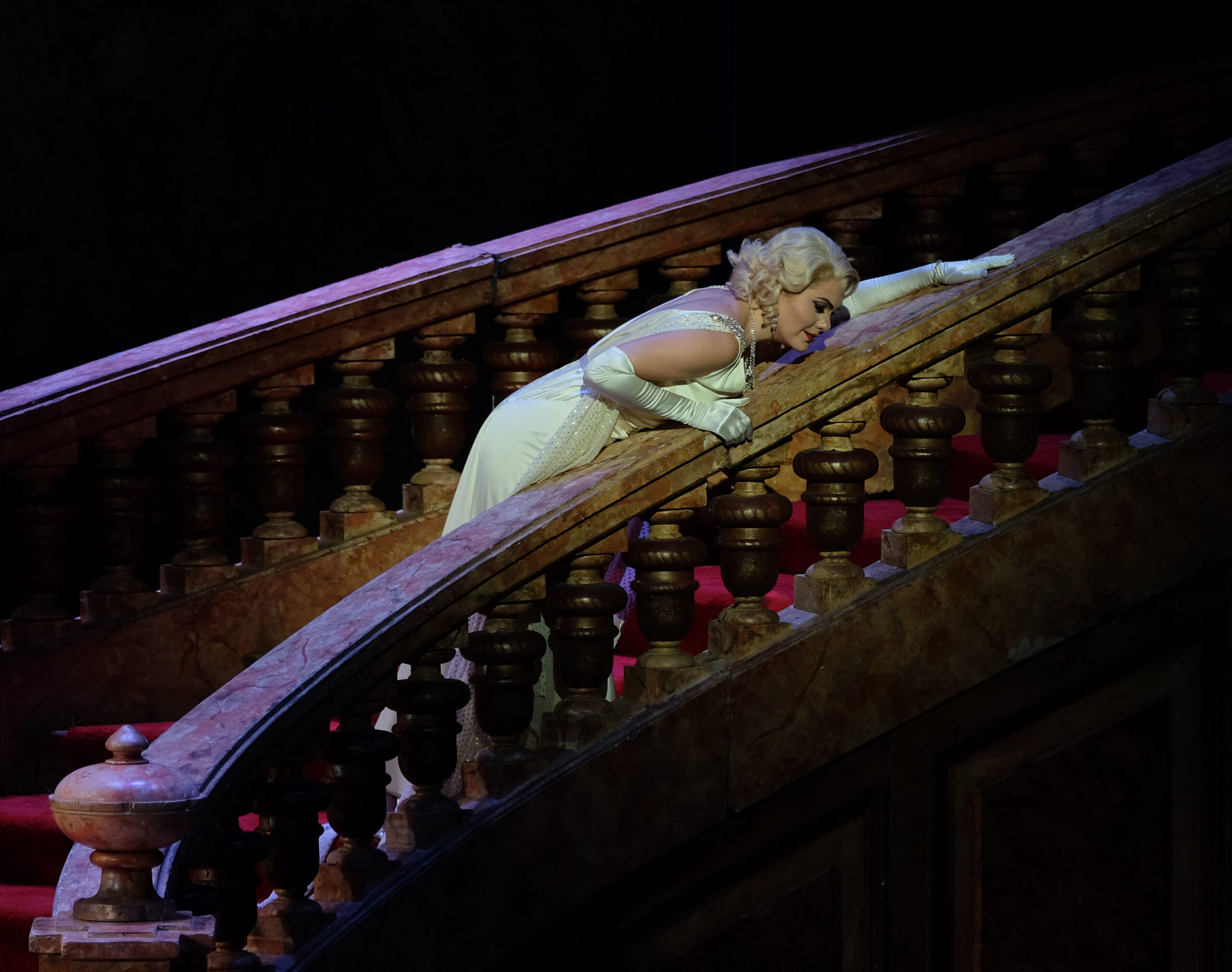Merrill Auditorium
July 26, 2017
by Christopher Hyde
“Enchanting” is not a word one reads often in music reviews, but it applies to the Opera Maine production of Verdi’s “La Traviata,” which opened Wednesday night at Merrill Auditorium.
I was prepared to turn up my willing suspension of disbelief to high volume—the plot of “La Traviata” is as full of holes as a political platform—but I was hooked from the first note of the prelude, as played by Stephen Lord’s fine orchestra, and captivated upon the raising of the curtain on a Parisian drawing room of the 1930s.
The set, by Lloyd Evans, with scenery provided by Opera Carolina, is marvelous, with its massive curved stairway in red velvet, and the costumes, by Millie Hiibel, are equally gorgeous. The garden of the second act evokes bucolic sophistication with a gazebo that dominates the scene.
Director Dona D. Vaughn’s choice of the 1930’s era, with its connotations of ”The Great Gatsby,” was inspired. “La Traviata,” written in 1853, failed on its first appearance due to its subject matter and staging in modern dress.
The initial flop was also due to an inappropriate diva in the title role of Violetta. That was not a problem with soprano Maria Natale, who not only has a glorious voice and acting ability, but actually looks the part. I had not remembered how difficult her role is to sing at all. Verdi’s score is as full of flourishes, ornaments and gigantic leaps in pitch as anything by Handel. To sing it with appropriate expression is trebly difficult, but Natale accomplished it believably, even in the prolonged death scene.
Tenor Mackenzie Whitney, as Alfredo, was equally appropriate, wooing Violetta with good looks, devotion and astonishing naivety. What makes him appealing to her, in this version, seems to have been his vulnerability.
In the father-and-son scenes, however, baritone Joo Won Kang, as Alfredo’s father Giorgio Germont, steals the show, especially in the well-known aria “Di Provenza il mar” in which he recalls happy moments in their house by the sea.
An accomplished chorus, under the direction of Robert Russell, lightens up the stage in Violetta’s lively parties, providing welcome comic interludes in the tragedy, including a fantastic gypsy dance and a lively pas de deux by principals of the Portland Ballet, Kelsey Harrison and Russell Hewey.
The minor roles, for which Verdi severely limits the number of lines sung, were also perfectly portrayed. Bass Hidenori Inoue, as Alfredo’s rival, Baron Duphol, is his exact opposite, projecting power and menace like a Samurai.
The final death scene is sometimes parodied as too long and over-blown, but Verdi’s music carries the day, making it as believable as Raymond Carver’s depiction of the death of Chekhov, in which the presiding doctor orders up a bottle of champagne. Such telling details, in which Vaughn excels, make it work.
Looking for something to quibble with, I inquired if it was possible for Alfredo and Duphol to have a duel in 1930. The last recorded duel in France occurred in 1967. (Oh well, the practice would make us all more polite.)
The performance earned a long and well-deserved standing ovation, finally bringing on stage almost everyone concerned, with flowers for Natale and Vaughn.
There are sill a few tickets left for Friday’s performance. I would urge anyone who loves opera to snap them up.
Christopher Hyde is a writer and musician who lives in Pownal. He can be reached at [email protected].

